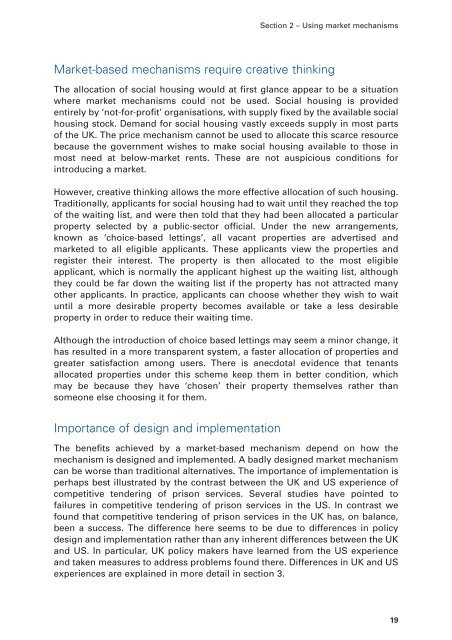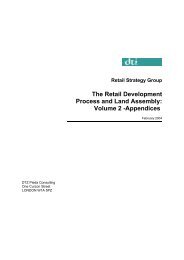Public Policy: Using Market-Based Approaches - Department for ...
Public Policy: Using Market-Based Approaches - Department for ...
Public Policy: Using Market-Based Approaches - Department for ...
You also want an ePaper? Increase the reach of your titles
YUMPU automatically turns print PDFs into web optimized ePapers that Google loves.
<strong>Market</strong>-based mechanisms require creative thinking<br />
The allocation of social housing would at first glance appear to be a situation<br />
where market mechanisms could not be used. Social housing is provided<br />
entirely by ‘not-<strong>for</strong>-profit’ organisations, with supply fixed by the available social<br />
housing stock. Demand <strong>for</strong> social housing vastly exceeds supply in most parts<br />
of the UK. The price mechanism cannot be used to allocate this scarce resource<br />
because the government wishes to make social housing available to those in<br />
most need at below-market rents. These are not auspicious conditions <strong>for</strong><br />
introducing a market.<br />
However, creative thinking allows the more effective allocation of such housing.<br />
Traditionally, applicants <strong>for</strong> social housing had to wait until they reached the top<br />
of the waiting list, and were then told that they had been allocated a particular<br />
property selected by a public-sector official. Under the new arrangements,<br />
known as ‘choice-based lettings’, all vacant properties are advertised and<br />
marketed to all eligible applicants. These applicants view the properties and<br />
register their interest. The property is then allocated to the most eligible<br />
applicant, which is normally the applicant highest up the waiting list, although<br />
they could be far down the waiting list if the property has not attracted many<br />
other applicants. In practice, applicants can choose whether they wish to wait<br />
until a more desirable property becomes available or take a less desirable<br />
property in order to reduce their waiting time.<br />
Although the introduction of choice based lettings may seem a minor change, it<br />
has resulted in a more transparent system, a faster allocation of properties and<br />
greater satisfaction among users. There is anecdotal evidence that tenants<br />
allocated properties under this scheme keep them in better condition, which<br />
may be because they have ‘chosen’ their property themselves rather than<br />
someone else choosing it <strong>for</strong> them.<br />
Importance of design and implementation<br />
Section 2 – <strong>Using</strong> market mechanisms<br />
The benefits achieved by a market-based mechanism depend on how the<br />
mechanism is designed and implemented. A badly designed market mechanism<br />
can be worse than traditional alternatives. The importance of implementation is<br />
perhaps best illustrated by the contrast between the UK and US experience of<br />
competitive tendering of prison services. Several studies have pointed to<br />
failures in competitive tendering of prison services in the US. In contrast we<br />
found that competitive tendering of prison services in the UK has, on balance,<br />
been a success. The difference here seems to be due to differences in policy<br />
design and implementation rather than any inherent differences between the UK<br />
and US. In particular, UK policy makers have learned from the US experience<br />
and taken measures to address problems found there. Differences in UK and US<br />
experiences are explained in more detail in section 3.<br />
19
















